To increase happiness through eating, focus on nutrients like Omega-3 fatty acids found in walnuts and chia seeds, known to improve brain health. B-Vitamins from leafy greens and nuts regulate mood. Magnesium in whole grains and nuts elevates happiness levels and stress response. Probiotics support gut- brain connection, aiding mood regulation. Colorful fruits and veggies rich in phytochemicals reduce brain inflammation, while hydration is crucial for mood regulation and energy levels. Limit added sugars, alcohol, and processed foods for mental wellness. Your food choices directly impact mental well-being; select wisely for improved mood and cognitive function. A balanced diet is key to a happier you.
Contents
Key Points
- Omega-3 fatty acids from walnuts and chia seeds improve brain health and well-being.
- B-Vitamins found in leafy greens, legumes, and nuts regulate mood and neurotransmitter production.
- Magnesium in leafy greens, whole grains, nuts, and seeds enhances happiness levels and mood balance.
- Colorful fruits and veggies rich in antioxidants and nutrients support mood regulation and mental wellness.
- Hydration is crucial for peak mental wellness, mood regulation, and energy levels.
The Power of Omega-3 Fatty Acids
By incorporating omega-3 fatty acids into your diet, you can improve your brain health and overall well-being. Omega-3 fats, found in foods like walnuts and chia seeds, play an important role in mood regulation. Walnuts, in particular, contain anti-inflammatory properties that benefit brain health, leading to increased interest in activities and higher energy levels when consumed regularly. Including fish in your meals can also help prevent depressive disorders due to its omega-3 content. Additionally, adding walnuts to your diet can result in significant mood improvements, contributing to your overall health.
Chia seeds, another source of omega-3s, can positively impact mental health and mood regulation. These tiny seeds can be easily incorporated into your meals, providing a plant-based alternative for those seeking to increase their omega-3 intake. By including these omega-3-rich foods in your diet, you can take a proactive step towards supporting your brain health and emotional well-being.
Boost Mood With B-Vitamins
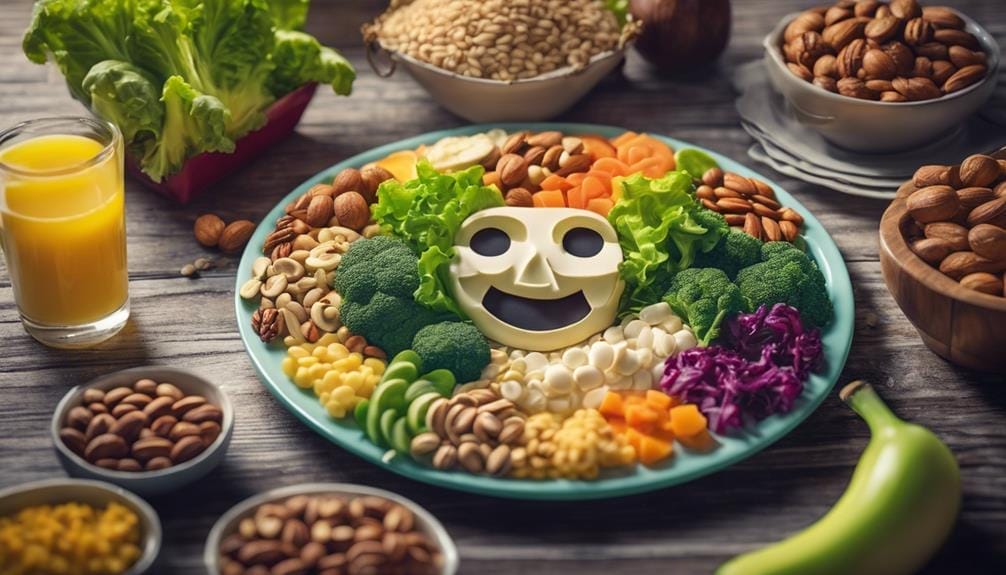
Want to feel happier and more upbeat? Well, guess what? You can totally boost your mood by chowing down on some B-vitamins. Yeah, these little guys like B6, B9, and B12 are like the mood regulators of the nutrient world. They're all about keeping your mental well-being in check and making sure you're feeling good all around.
B-Vitamins and Happiness
B-Vitamins play an essential role in regulating your mood and supporting neurotransmitter production, influencing your mental well-being and happiness. Incorporating B-vitamin-rich foods into your diet can help improve mood and overall mental well-being.
- B-vitamins like B6, B9 (folate), and B12 aid in mood regulation and neurotransmitter production.
- Low levels of B-vitamins are linked to symptoms of depression, anxiety, and fatigue.
- Foods rich in B-vitamins include leafy greens, legumes, whole grains, nuts, seeds, and animal products like fish and poultry.
- B-vitamins contribute to the synthesis of serotonin and dopamine, important neurotransmitters for mood stability and happiness.
- Ensuring an adequate intake of B-vitamins can positively impact your emotional health and overall happiness.
Foods Rich in B-Vitamins
Incorporate foods rich in B-vitamins into your daily meals to support mood regulation and improve your mental well-being.
B-vitamins, such as B6, B9 (folate), and B12, are crucial for maintaining a healthy mood. Foods like leafy greens, nuts, seeds, and whole grains are great sources of these important nutrients.
B-vitamins play a significant role in the production of neurotransmitters like serotonin, which are key for stabilizing mood. Deficiencies in B-vitamins can lead to symptoms of depression, anxiety, and fatigue.
Impact on Mood
To enhance your mood and mental well-being, consider the impact of B-vitamins on regulating neurotransmitters like serotonin, crucial for stabilizing emotions.
- B-vitamins aid in the production of neurotransmitters like serotonin, which regulate mood.
- Research suggests that B-vitamin deficiencies are linked to mood disorders such as depression and anxiety.
- Foods rich in B-vitamins include leafy greens, whole grains, nuts, seeds, and lean proteins like fish and poultry.
- Consuming adequate B-vitamins can help improve mood, energy levels, and overall mental well-being.
- Incorporating B-vitamin-rich foods into your diet can support healthy brain function and promote emotional balance.
Magnesium: The Happiness Mineral
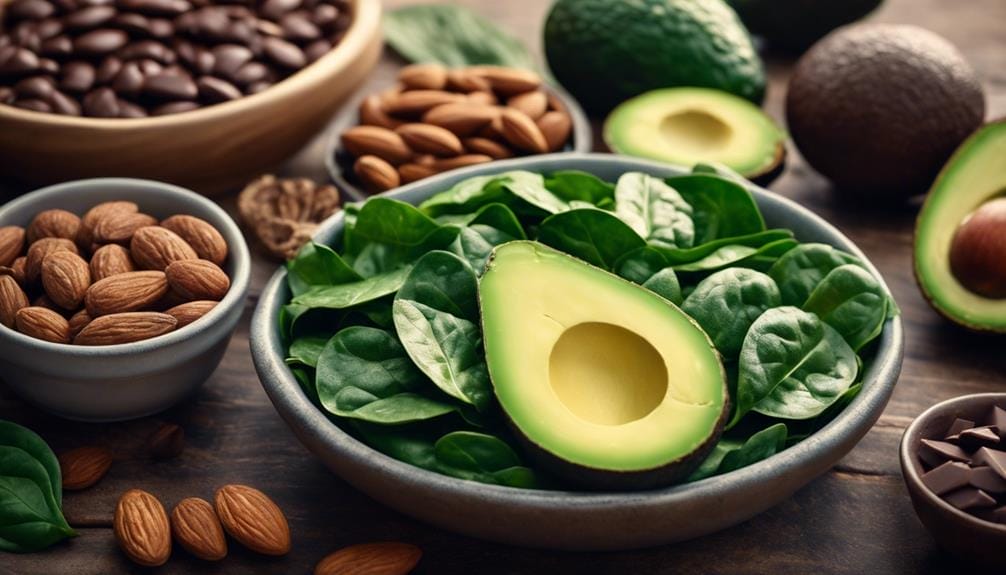
Enhance your happiness levels by ensuring an adequate intake of magnesium-rich foods in your diet. Magnesium, known as the ‘happiness mineral,' is pivotal for overall well-being. Low levels of magnesium have been linked to symptoms such as anxiousness, irritability, and sleep disorders. It plays a significant role in regulating the body's stress response, making it important for maintaining a balanced mood.
Unfortunately, up to 70% of people may not be getting enough magnesium in their diets. To increase your magnesium intake, incorporate foods like leafy greens, whole grains, nuts, and seeds into your daily meals. These sources aren't only delicious but also packed with the necessary mineral your body craves for optimal functioning.
Probiotics for Gut-Brain Connection
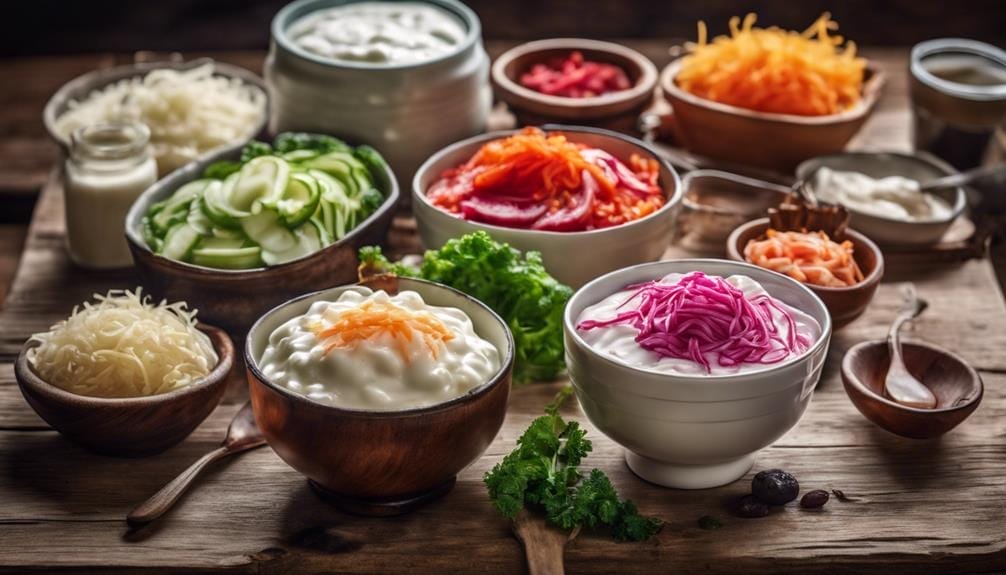
Improve your mental well-being by harnessing the power of probiotics for a healthy gut-brain connection. Probiotics play a vital role in supporting gut health, which in turn influences your mental well-being through the gut-brain axis.
Here are some key points to keep in mind:
- Probiotics are beneficial bacteria that bolster gut health and the gut-brain connection.
- Studies suggest that probiotics can help alleviate symptoms of anxiety and depression.
- Probiotics assist in the production of neurotransmitters that affect mood regulation.
- Consuming probiotic-rich foods like yogurt and sauerkraut can boost mental well-being.
- The gut-brain axis underscores the importance of gut health in shaping mental health outcomes.
Colorful Fruits and Veggies
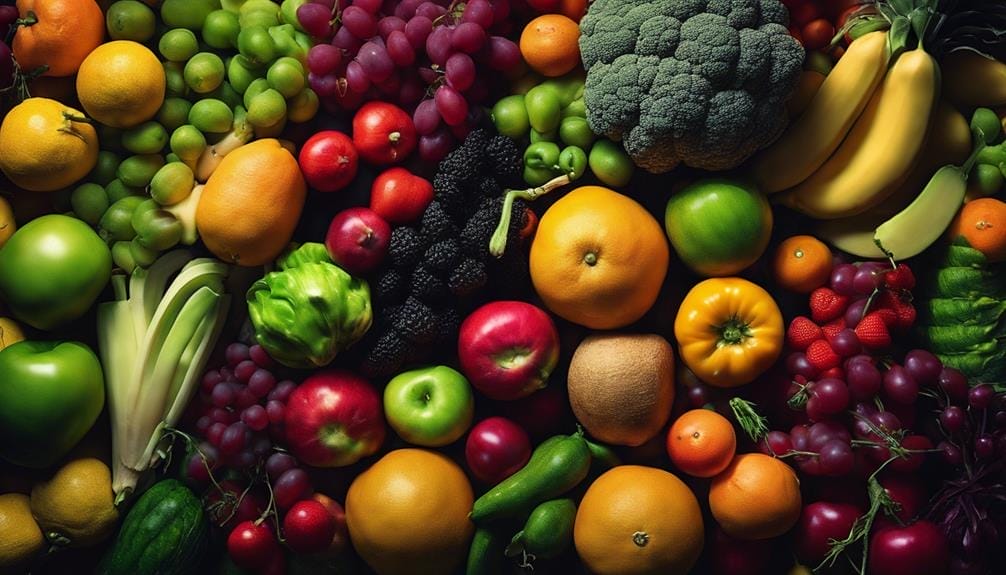
Hey there! So, munching on a variety of colorful fruits and veggies is like giving your body a big hug of essential nutrients. These bright and juicy foods are loaded with vitamins, minerals, and antioxidants that do wonders for your health. By adding a splash of color to your plate with these goodies, you're basically giving your body and mind a high-five for a happier, healthier you.
And let me tell you, these vibrant fruits and veggies are like a treasure trove of goodness. They're chock-full of all the good stuff your body craves, from vitamins to antioxidants, all working together to keep you feeling amazing. So, why not sprinkle some color into your meals and let your body soak up all that goodness? It's like a little gift you give yourself every day.
It's pretty cool how nature packs so much goodness into these colorful treats. They're like little powerhouses of health benefits, just waiting for you to dig in and enjoy. By making them a part of your daily routine, you're not just eating – you're nourishing your body and mind in the best way possible. So go on, grab a rainbow of fruits and veggies, and let your body thank you later.
Rainbow of Nutrients
Indulging in a vibrant array of colorful fruits and veggies can greatly improve your mental well-being and happiness levels. These nutrient-packed foods are vital for excellent brain health and overall mental wellness. Here are five reasons why incorporating a rainbow of fruits and vegetables into your diet can lead to a happier you:
- Fruits and vegetables are rich in phytochemicals that reduce inflammation in the brain.
- Antioxidants found in colorful produce support mood regulation and positive mood states.
- Vitamins and minerals in these foods play a significant role in supporting brain health.
- Consuming a variety of colorful fruits and veggies can increase energy levels.
- Regularly eating a rainbow of fruits and vegetables can lead to improved mood and sustained mental wellness.
Fresh and Vibrant
Incorporating a vibrant variety of colorful fruits and vegetables into your daily meals can greatly improve your mental well-being and happiness levels. These healthy foods are packed with vitamins, minerals, and antioxidants that support mood regulation and overall mental health. Research has shown that a diet rich in colorful fruits and veggies is linked to better mental wellness and increased happiness.
Health Benefits Abound
The importance of health benefits from colorful fruits and vegetables is undeniable. Incorporating these into your diet can greatly impact your mental health and overall happiness. Here are some reasons why you should load up on these nutrient-packed foods:
- Research shows that colorful fruits and veggies are linked to improved mental wellness and happiness levels.
- Consuming a variety of these foods can lead to increased happiness, even on subsequent days.
- The vitamins, minerals, and antioxidants in these foods support mood regulation and positive mood states like purpose and creativity.
- Studies directly correlate colorful fruits and veggies with positive mood states, emphasizing their significance in your diet.
- Nutrients found in these foods play an essential role in supporting mental well-being and overall happiness.
Hydration for Mental Wellness
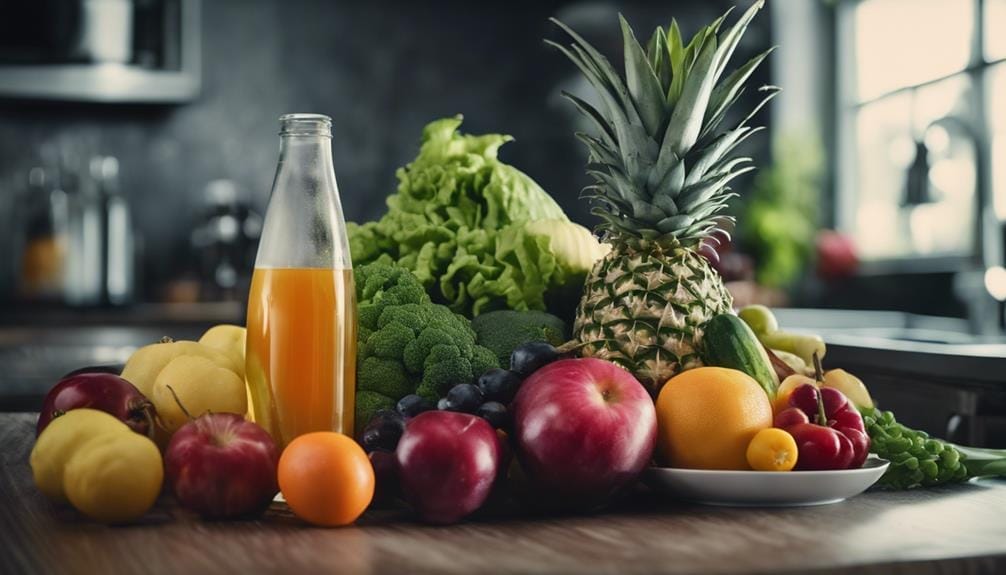
Ensuring sufficient hydration is crucial for maintaining peak mental wellness, as it plays a significant role in mood regulation and energy levels. Adequate hydration can improve your mood and help you maintain peak energy throughout the day. When you don't drink enough water, you might experience concentration issues and increased tension, impacting your mental health. Dehydration can even have a negative effect on mood regulation in the brain, leading to feelings of irritability or low energy.
To support your mental health, aim to drink around 15 ½ cups of fluid daily if you're a man, and about 11 ½ cups if you're a woman. Remember, hydration doesn't just come from water; other beverages and water-rich foods can also contribute to meeting your daily needs. By keeping yourself well-hydrated, you're taking a proactive step towards enhancing your mood, energy, and overall mental well-being.
Foods to Limit for Happiness

To promote a happier mood and general mental well-being, it's important to be mindful of certain foods that should be limited in your diet. When aiming for increased happiness, consider the following:
- Added Sugars: High intake of added sugars is linked to increased stress levels and can negatively impact mood regulation.
- Alcohol: Excessive alcohol consumption can contribute to mental wellness issues like depression and anxiety.
- Caffeine: Monitoring caffeine intake is vital to avoid potential side effects such as jitteriness and disrupted sleep patterns.
- Red Meat: Reducing red meat consumption and opting for whole, plant-based foods over processed options can support a happier mood.
- Processed Foods: Limiting intake of processed foods high in trans fats and artificial additives can help maintain mental well-being.
Making informed choices about what you eat can play a significant role in your mental health. By being selective in your food consumption, you can contribute to a positive mindset and overall well-being.
Conclusion
To sum up, incorporating omega-3 fatty acids, B-vitamins, magnesium, probiotics, colorful fruits and veggies, and staying hydrated can all contribute to increased happiness.
By being mindful of what you eat and making smart choices, you can positively impact your mood and overall well-being. Remember, food isn't just fuel for the body, but also for the mind.
Make sure to nourish both to truly thrive in life. As the saying goes, ‘you are what you eat.' Choose wisely for a happier you.
